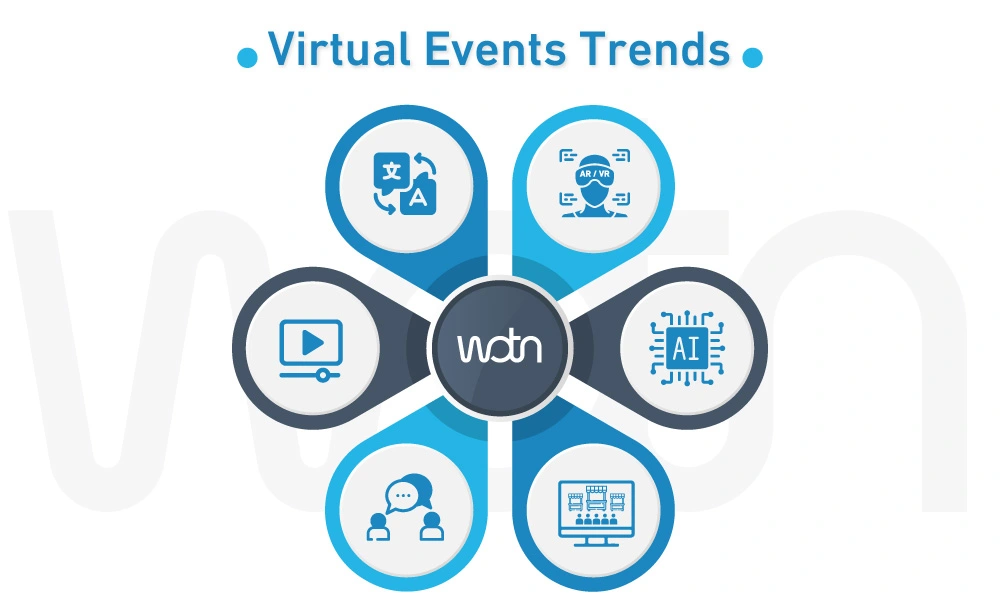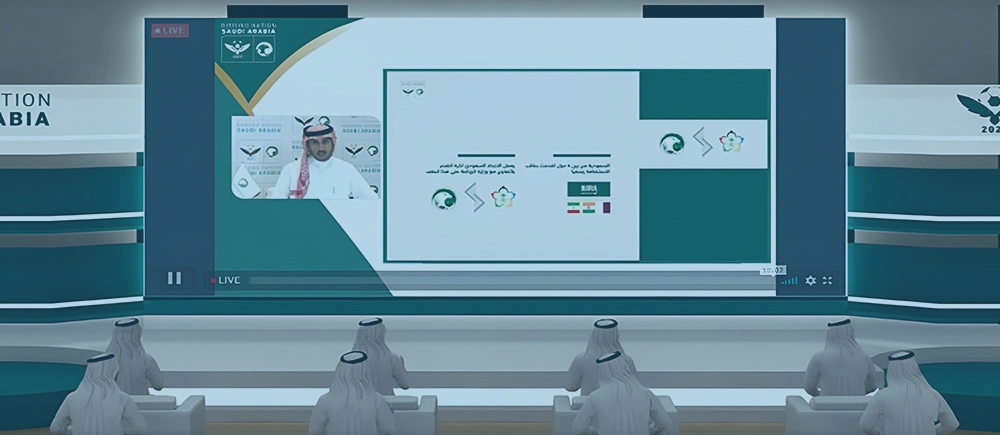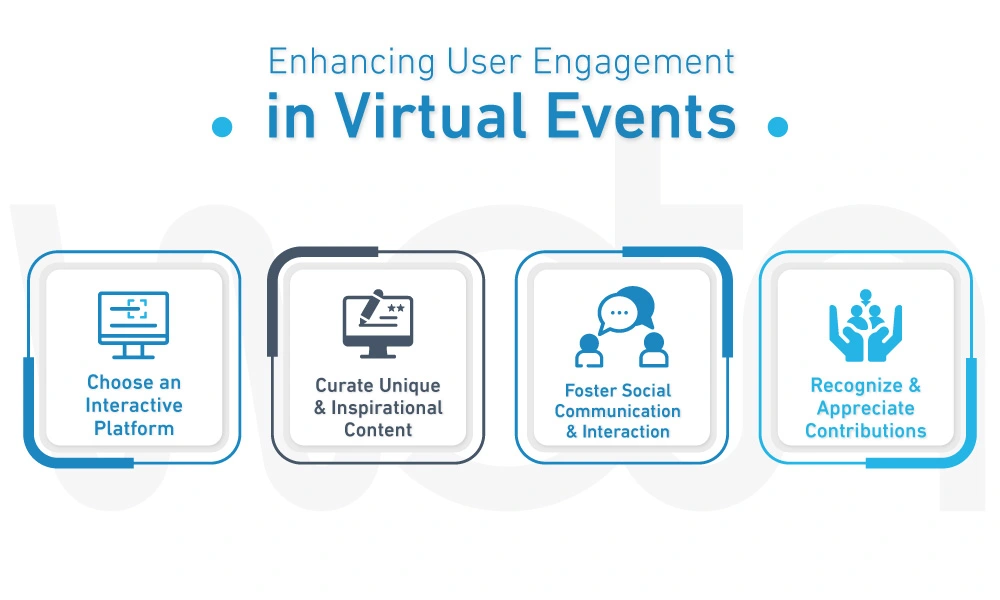Your Vision, Delivered
Say hello to the real experience!
Bring your next event to life—guided by experience, innovation, and excellence.
Let’s create together
Imagine attending a conference in Paris or New York without leaving your home, where you participate in scientific lectures and various workshops and interact with speakers! This is not a fantasy, but a reality that has been happening for years, thanks to virtual events that have spread their wings to take us on an endless journey in the world of knowledge and discovery, making the impossible possible, and turning the unconventional into the familiar. With technological advancements, virtual events have become more interactive, realistic, and participatory than ever before.
There are some statistics that highlight the importance and prevalence of virtual events. One notable report by Grand View Research indicates that the virtual events market is projected to reach $404 billion USD by 2027, with a compound annual growth rate (CAGR) of 23.2%. In 2023, we can see that the virtual events industry is continuously evolving, becoming one of the most effective ways to engage with audiences and deliver unique content.
In this article, we will explore the key virtual event trends for 2023 and delve into how they can be used to achieve exceptional success. We'll also discover the latest technological innovations available and provide you with essential tips to enhance the participant experience in virtual events.
Virtual events trends are witnessing notable developments and increased popularity, catering to the needs of individuals in the modern era characterized by advanced technology and digital communication. These trends reflect the changing audience demands, aiming to enhance participants' experience and engagement with the events. Here are the most prevalent and widespread trends:

Currently, virtual events are increasingly utilizing augmented reality and virtual reality technologies. These technologies enable participants to engage more realistically in events regardless of their geographical location. Participants can use specialized headsets or devices to immerse themselves in a three-dimensional virtual environment, resulting in innovative interactions with content and other attendees.
According to a report by Mordor Intelligence, virtual events are expected to grow at a compound annual rate of around 23% from 2021 to 2026, primarily due to the rising demand for augmented and virtual reality experiences.
The implementation of Artificial Intelligence (AI) has significantly contributed to the development of virtual events. AI helps collect and analyze data generated during these events. It allows event organizers to accurately and instantly evaluate participants' satisfaction and engagement, replacing unreliable surveys and responses.
AI can also track the number, duration, and quality of interactions during the event, identify patterns and trends, and derive insights from the data. With this advanced technology, personalized content and targeted advertisements can be delivered to each participant based on their specific needs and interests.
According to reports from Nuevodesign, AI has become one of the key trends for virtual events in 2023. This approach enhances participants' experience and increases the return on investment for event organizers, making it an ideal choice for developing virtual events and attracting a wider and more engaged audience.
Organizing hybrid events is a revolutionary step in the world of gatherings and communication, combining the features of both physical and virtual events. These events allow participants to interact with each other, whether they are physically present at the venue or virtually connected online. Currently, hybrid events are gaining increasing popularity among institutions and companies seeking to expand their reach and increase their return on investment.
Hybrid events rely on sophisticated platforms like Airmeet, providing seamless management and organization of all aspects of the event. This allows organizers to deliver an effective and engaging experience to both physically present attendees and virtual participants alike.
According to a report by Obvious Technologies, social and collaborative networks are expected to continue expanding and attracting more attention in 2023. These networks offer unique features that enable users to gain professional knowledge in the technology field, making them powerful tools for communication and interaction in virtual events.
With these remarkable technologies, participants in virtual events can easily and seamlessly communicate, eliminating feelings of isolation or disconnection. On the contrary, they can utilize social media platforms to build relationships and communities with others who share similar interests and goals, exchanging expertise and knowledge.
Virtual event participants can fully benefit from applications like "Run The World - Airmeet - Wonder," which allow them to engage in group or one-on-one video conversations, create discussion groups and chats, and exchange content, opinions, and comments. Thanks to these innovative applications, social interaction in virtual events becomes a smooth and enjoyable experience, enhancing interaction among participants and deepening social connections.
Live streaming and on-demand videos provide participants with flexibility and freedom to watch events at their convenience and from locations that suit them best. Moreover, it allows them to replay, pause, or fast-forward content based on their personal preferences. This unique experience captivates participants, increasing engagement and involvement in virtual events.
As part of the virtual events trends, participants can share their experiences with others through social media platforms and other digital channels, effectively promoting and expanding the event's reach.
Grand View Research anticipates a 28.1% growth in the live streaming services market during the projected period of 2020-2027, with a total market size reaching $247.27 billion by 2027. This sustainable growth reflects the promising impact of technology in bringing positive transformations to the virtual event experience and enhancing its appeal to attendees.
The importance of automatic translation and post-editing is increasing in 2023, as companies and organizations rely on modern technologies to improve the quality, speed, and efficiency of translation. Furthermore, innovative technologies like augmented reality and interactive virtual reality are expected to be enhanced by translation services in virtual events that require multilingual support.
These new virtual event trends represent a significant step towards enhancing the translation experience and achieving a more distinct interactivity for users in virtual events. After exploring the key virtual event trends, we will now delve into the most prominent technological innovations present in virtual events.
Read More About: Top Types of Events
Now, let's explore the most prominent technological innovations available in virtual events, which enhance and improve the virtual participation experience, making it more engaging and interactive. Among these innovations are:

With the continuous progress of virtual events and the incorporation of these technological innovations, participants will have the opportunity to relish more captivating and enriching virtual experiences in the future. Preparing for this evolving landscape is essential to cater to the escalating audience demands for advanced and inventive virtual events.
Read also: Best Ways for Precise Planning The Event Budget
To enhance user engagement and attract more participants to virtual events, you can implement innovative strategies and best practices:

By implementing these effective tips, you will undoubtedly witness a substantial increase in user engagement and active interaction during virtual events.
As we wrap up our discussion on the key virtual event trends for 2023, it's evident that the ever-evolving digital landscape provides a promising platform to craft exceptional and unparalleled experiences for participants. The cutting-edge technological trends and advanced tools have the potential to turn virtual events into thrilling journeys that transcend ordinary reality, precisely catering to the needs and desires of the audience.
Now, the question arises: How can you organize a successful and effective virtual event? This is where WOTN platform becomes your ideal partner for your upcoming virtual event. With us, you don't need any technical expertise or skills to create a professional and engaging event. Define your objectives, target audience, theme, and budget, and our dedicated team will provide you with technical support and professional service throughout your event planning journey.
We specialize in organizing virtual events and hybrid events, striving to make each one unique and outstanding with innovation and freshness. Our goal is to help you harness innovative technologies and enhance audience engagement in an exceptional and impressive manner. There's no need to wait; join us now, and together, we will create a virtual event that leaves an indelible mark in your audience's memory and achieves the distinctiveness and excellence you truly deserve.
Say hello to the real experience!
Bring your next event to life—guided by experience, innovation, and excellence.
Let’s create together
